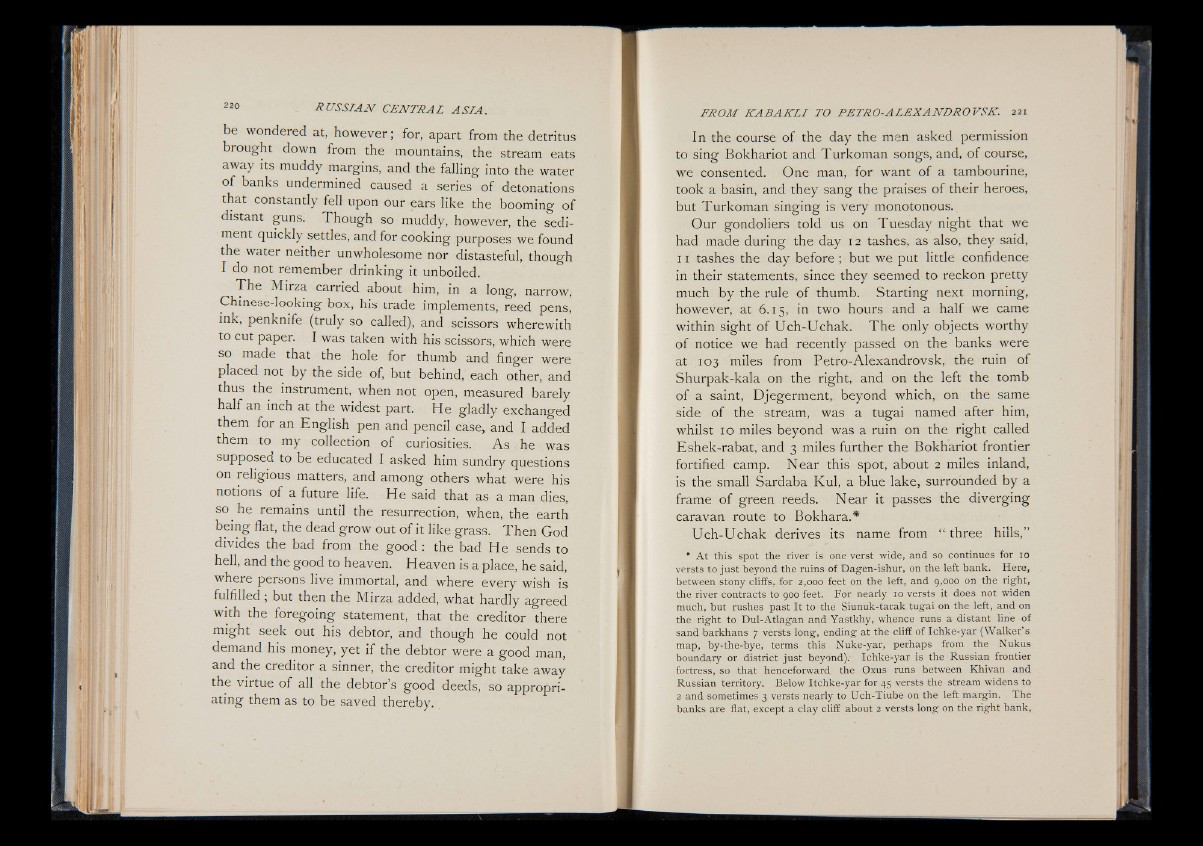
be wondered at, however; for, apart from the detritus
brought down from the mountains, .the stream eats
away its muddy margins, and the falling into the water
of banks undermined caused a series of detonations
that constantly fell upon our ears like the booming of
distant guns. Though so muddy, however, the sediment
quickly settles, and for cooking purposes we found
the water neither unwholesome nor distasteful, though
I do not remember drinking it unboiled.
The Mirza carried about him, in a long, narrow,
Chinese-looking box, his trade implements, reed pens!
ink, penknife (truly so called), and scissors wherewith
to cut paper. I was taken with his scissors, which were
so made that the hole for thumb and finger were
placed not by the side of, but behind, each other, and
thus the instrument, when not open, measured barely
half an inch at the widest part. He gladly exchanged
them for an English pen and pencil case, and I added
them to my collection of curiosities. A s he was
supposed to be educated I asked him sundry questions
on religious matters, and among others what were his
notions of a future life. He said that as a man dies,
so he remains until the resurrection, when, the earth
being flat, the dead grow out of it like grass. Then God
divides the bad from the good : the bad He sends to
hell, and the good to heaven. Heaven is a place, he said,
wbere persons live immortal, and where every wish is
fulfilled, but then the Mirza added, what hardly agreed
with the foregoing statement, that the creditor there
might seek out his debtor, and though he could not
demand his money, yet if the debtor were a good man,
and the creditor a sinner, the creditor might take away
the virtue o f all the debtor s good deeds, so appropriating
them as to be saved thereby.
In the course of the day the men asked permission
to sing Bokhariot and Turkoman songs, and, of course,
we consented. One man, for want of a tambourine,
took a basin, and they sang the praises of their heroes,
but Turkoman singing is very monotonous.
Our gondoliers told us on Tuesday night that we
had made during the day 12 tashes, as also, they said,
11 tashes the day before; but we put little confidence
in their statements, since they seemed to reckon pretty
much by the rule of thumb. Starting next morning,
however, at 6.15, in two hours and a half we came
within sight of Uch-Uchak. The only objects worthy
of notice we had recently passed on the banks were
at 103 miles from Petro-Alexandrovsk, the ruin of
Shurpak-kala on the right, and on the left the tomb
of a saint, Djegerment, beyond which, on the same
side of the stream, was a tugai named after him,
whilst 10 miles beyond was a ruin on the right called
Eshek-rabat, and 3 miles further the Bokhariot frontier
fortified camp. Near this spot, about 2 miles inland,
is the small Sardaba Kul, a blue lake, surrounded by a
frame of green reeds. Near it passes the diverging
caravan route to Bokhara.*
Uch-Uchak derives its name from “ three hills,”
* At this spot the river is one verst wide, and so continues for 1 0
versts to just beyond the ruins of Dagen-ishur, on the left bank. Here,
between stony cliffs, for 2,000 feet on the left, and 9,000 on the right,
the river contracts to 900 feet. For nearly 10 versts it does not widen
much, but rushes past It to the Siunuk-tarak tugai on the left, and on
the right to Dul-Atlagan and Yastkhy, whence runs a distant line of
sand barkhans 7 versts long, ending at the cliff of Ichke-yar (Walker’ s
map, by-the-bye, terms this Nuke-yar, perhaps from the Nukus
boundary or district just beyond). Ichke-yar is the Russian frontier
fortress, so that henceforward the Oxus runs between Khivan and
Russian territory. Below Itchke-yar for 45 versts the stream widens to
2 and sometimes 3 versts nearly to Uch-Tiube on the left margin. The
banks are flat, except a clay cliff about 2 versts long on the right bank,